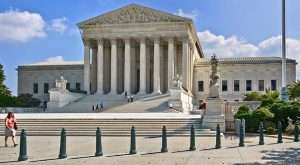The Volokh Conspiracy
Mostly law professors | Sometimes contrarian | Often libertarian | Always independent
Biden Releases Names of Members of His Supreme Court Commission [Updated]
It's a genuinely bipartisan and cross-ideological group. And one that isn't good news for advocates of court-packing.

Earlier today, President Biden issued a list of the members of his planned Presidential Commission on the Supreme Court of the United States. This is the judicial reform commission he promised to create during the presidential campaign. As expected, the Commission will be co-chaired by former Obama White House Counsel Bob Bauer, and Yale Law School Professor Cristina Rodriguez. Most of the rest of the members are legal scholars, including my fellow Volokh Conspiracy bloggers Will Baude (University of Chicago) and Keith Whittington (Princeton).
Perhaps more importantly, this is a genuinely bipartisan and cross-ideological group. In addition to Will and Keith, there are several other conservative or libertarian members, including Jack Goldsmith (Harvard), Judge Thomas Griffith (formerly of the DC Circuit), Michael Ramsey (University of San Diego), Tara Leigh Grove (University of Alabama), Caleb Nelson (Univ. of Virginia), and Adam White (my George Mason University colleague). This group will be in a minority on a commission with some thirty-six total members (if I have counted correctly). But it will be large enough to have some real clout.
I won't go through their credentials here. But the commissioners, both left and right, are an impressive group with a vast array of knowledge and experience collectively including almost every aspect of the Supreme Court's work.
As I predicted back in January, the composition of the Commission is also bad news for advocates of court-packing, who may have hoped that it will produce a report endorsing the idea. Obviously, I am confident none of the right-of-center members would endorse such an idea. But several of the liberals (including co-chair Bob Bauer and Laurence Tribe) are also on record opposing it.
There are likely some court-packing advocates in the group. But it is highly unlikely they can command majority support in the Commission. The same goes for various proposals to enact court-packing by another name, such as "rotation" and "court balancing."
While the Commission is unlikely to endorse court-packing, it could potentially agree on other reforms that have much broader cross-ideological support, such as 18-year term limits for Supreme Court Justices. I support that idea myself, but also believe it requires a constitutional amendment. By contrast, some legal scholars (including commission member Jack Balkin), contend that it (or something close to it) can be enacted by ordinary legislation. That issue may well be a focus of debate within the Commission.
One interesting aspect of the Commission is that its mandate will be limited to considering proposals to reform the Supreme Court only:
The Commission's purpose is to provide an analysis of the principal arguments in the contemporary public debate for and against Supreme Court reform, including an appraisal of the merits and legality of particular reform proposals. The topics it will examine include the genesis of the reform debate; the Court's role in the Constitutional system; the length of service and turnover of justices on the Court; the membership and size of the Court; and the Court's case selection, rules, and practices.
I take it this means they will not consider possible reforms to the rest of the federal judiciary.
Most presidential commissions don't amount to much. They often end up just issuing reports that are quickly forgotten, doomed to gather dust on bookshelves. That could well be the fate of this commission, as well. But there is at least some real chance it could be an exception, if it can reach a broad consensus in favor of term limits or some other similar proposal.
The Commission will hold hearings where it will take testimony from experts, and is required to issue a report within 180 days of its first public hearing. I, for one, look forward to reading it!
UPDATE: It's worth noting that the Commission could potentially provide an analysis of possible reform options, without actually making a recommendation. Co-blogger Josh Blackman suggests that its mandate may not allow it to recommend anything. But the executive order outlining the Commission's goals indicates that, among other things, it will provide "an analysis of the principal arguments in the contemporary public debate for and against Supreme Court reform, including an appraisal of the merits and legality of particular reform proposals." To my mind, "an appraisal of the merits and legality of particular reform proposals" allows (and perhaps even requires) the Commission to endorse or reject specific reforms.
Thus, the Commission could issue a report backing one or more specific reform proposals. Whether that backing takes the form of an official "recommendation" may not matter much.


Show Comments (35)